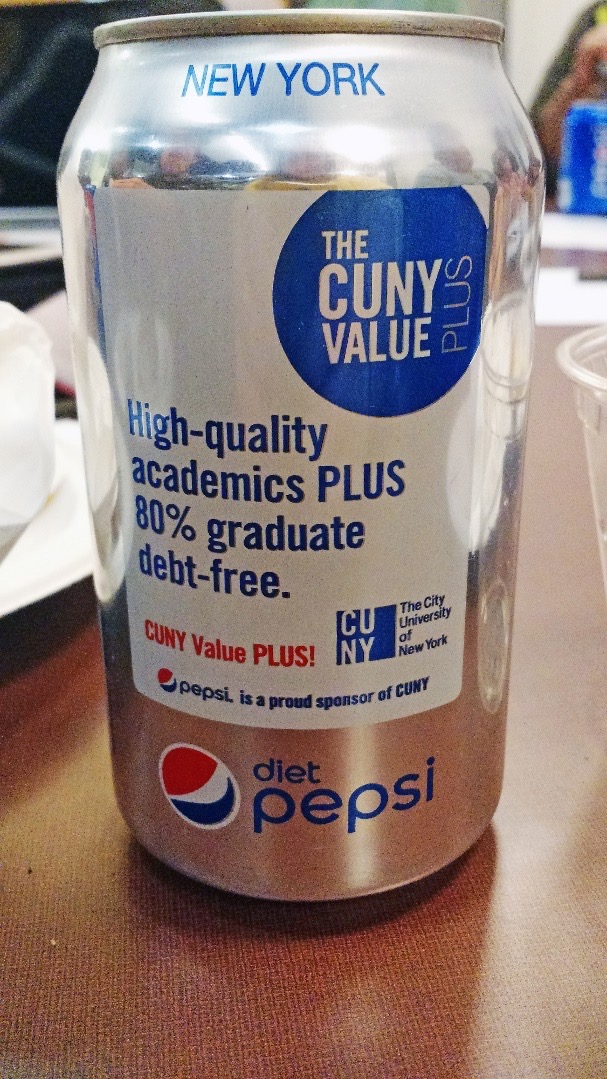UPDATED: JULY 2, 2023
1060 words 5.4 min read
In 2013, CUNY signed a 10-year pouring rights contract with PepsiCo, giving that company exclusive rights to sell its beverages in all vending machines and cafeterias at CUNY. Now a group of students, faculty, and staff are urging CUNY not to renew this contract. Distinguished Professor of Public Health, Co-Founder and Senior Faculty Fellow at the CUNY Urban Food Policy Institute, Nick Freudenberg, interviews Eman Faris, Director of Advocacy at the Institute about this initiative.
NICK FREUDENBERG (NF): EMAN, CAN YOU EXPLAIN WHAT IS A POURING RIGHTS CONTRACT?
Eman Faris (EF): In a pouring rights contract, universities are essentially selling exclusive access to their own campuses, allowing beverage companies to push their sugar-sweetened beverages on students, faculty, and staff. These multi-year contracts give PepsiCo and Coca-Cola the exclusive rights to sell and market their products within an institutional setting in exchange for sponsorship and other payments. In CUNY’s case, university administrators signed a 10-year pouring rights contract in 2013 with PepsiCo in exchange for $21 million to be paid to the university over the course of the agreement.
NF: WHY DO PEPSI (AND OTHER SUGARY BEVERAGE COMPANIES) WANT TO DEVELOP EXCLUSIVE POURING RIGHTS CONTRACTS WITH UNIVERSITIES LIKE CUNY?
EF: Signing a pouring rights contract with university systems offers two things for beverage companies like PepsiCo and Coca-Cola:
First, it gives access to an exclusive marketplace without competing brands. The beverage company becomes the sole provider of all beverages sold on campus. In CUNY’s case, Pepsi is considered the “official soft drink” of the university.
Second, it provides the opportunity to connect with young people to build loyal, lifelong customers. This is especially important for beverage companies as sales of sodas and other sugary drinks in the United States have started to decline over the last few decades. The youth market is an opportunity for beverage companies to tap into potential new customers because whatever brands youth become loyal to as children and young adults are typically the brands that they’ll continue to support well into adulthood. Beverage companies understand this and are willing to invest millions of dollars to get young people, such as our CUNY students, hooked on these products for life.
NF: WHY ARE SOME CUNY STUDENTS, FACULTY, AND STAFF OPPOSING A RENEWAL OF THE POURING RIGHTS CONTRACT WITH PEPSI? WHAT IS THEIR RATIONALE FOR OPPOSING A RENEWAL?
EF: I think there are a few main reasons.
First, in a CUNY-wide survey, we distributed across the 25 campuses, nearly 91% of over 1,000 respondents indicated that CUNY should terminate its pouring rights contract with PepsiCo and seek out alternative options that better align with the university’s values of health, sustainability, and democracy. Sugar-sweetened beverages like the PepsiCo products sold on our campuses are the leading causes of obesity, diabetes, and other preventable illnesses in New York City and the nation. CUNY should prioritize student health and wellness over corporate profit.
Second, discarded waste from PepsiCo products is one of the largest contributors to global plastic pollution. CUNY should invest in waste-free beverage alternatives to meet its commitment to reduce and eliminate single-use plastics on campus. Another large issue with the current pouring rights contract is the lack of transparency and shared democracy over these decisions that impact hundreds of thousands of CUNY students, faculty, and staff. The administration should allow members of the CUNY community to have a meaningful voice in shaping their school’s food and beverage environment. Our poll shows most are opposed.
Lastly, the opposition to CUNY’s pouring rights contract is actually not new. Prior to even signing the contract, the Healthy CUNY Initiative formed the CUNY Campaign for Healthy Food (CHeF) in 2011, a program designed to improve healthy food choices in the school’s cafeterias, vending machines, and meetings; reduce consumption of soda and other sugar-sweetened beverages; and educate the campus about diet-related preventative conditions. CUNY CHeF presented several recommendations in 2012 to improve the campus food and beverage environment, including a plan for adopting the NYC Food Standards Guidelines developed by the DOHMH to reduce the availability of sugar beverages throughout CUNY and increase free access to clean drinking water. Despite these recommendations put forth, CUNY went ahead and signed a 10-year pouring rights contract with PepsiCo in exchange for $21 million. With the expiration of the contract closing on June 30th, 2023, we believe this is the perfect opportunity to re-imagine CUNY’s food environment beyond a pouring rights contract.

Coca-Cola and Pepsi contribute more to plastic pollution than any other companies in the world. Image Credit: Food and Water Watch.
NF: WHAT ROLES HAVE STUDENTS AND FACULTY PLAYED IN CALLING ATTENTION TO POURING RIGHTS IN OTHER UNIVERSITY SYSTEMS?
EF: Efforts to end pouring rights contracts within university systems is a growing national movement. Our CUNY CHeF coalition is working closely with our partners at the Center for Science in the Public Interest, an independent science-based advocacy organization, which has connected us to other university advocates pushing for the end of exclusive contracts between their campuses and Big Soda companies. We’ve been learning a lot from our partners at the University of California, who have been leading their own #PourOutPepsi campaign since 2018, which is even before the pandemic.
NF: HOW CAN CUNY STUDENTS, FACULTY, AND STAFF WHO WANT TO END CUNY’S PEPSI CONTRACT JOIN THIS EFFORT?
EF: They can connect with our growing CUNY CHeF coalition to support driving our campaign goals forward. Share your thoughts on the food and beverage choices offered at your school through our campus-wide survey. Your honest feedback will benefit the CUNY community and will help us achieve healthier and more inclusive food environments. We are currently working to get the Chancellor’s attention on this issue and present our findings to him in hopes of persuading him to NOT renew the contract and instead commit to designing a healthier, more sustainable, and more equitable food system on campus.
About the Interviewee:

Eman Faris is the Director of Food Advocacy and comes to the Institute from the Summer Public Health Scholars Program (SPHS) at Columbia University where she worked as a coordinator supporting students through a 10-week immersive experience to prepare them for a career in public health. Eman has also worked supporting food justice initiatives in upper Manhattan with the Washington Heights & Inwood (WHIN), helping to manage volunteers and overseeing all day-to-day activities.
